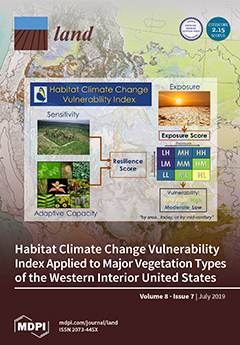Resources
Displaying 1696 - 1700 of 2258Social Impacts of Land Acquisition for Oil and Gas Development in Uganda
Uganda’s oil and gas sector has transitioned from the exploration phase to the development phase in preparation for oil production (the operations phase). The extraction, processing, and distribution of oil require a great deal of infrastructure, which demands considerable acquisition of land from communities surrounding project sites. Here, we examine the social impacts of project land acquisition associated with oil production in the Albertine Graben region of Uganda.
Challenges and Opportunities of Social Media Data for Socio-Environmental Systems Research
Social media data provide an unprecedented wealth of information on people’s perceptions, attitudes, and behaviors at fine spatial and temporal scales and over broad extents. Social media data produce insight into relationships between people and the environment at scales that are generally prohibited by the spatial and temporal mismatch between traditional social and environmental data. These data thus have great potential for use in socio-environmental systems (SES) research.
Operationalizing Vulnerability: Land System Dynamics in a Transfrontier Conservation Area
Understanding how individuals, communities, and populations vary in their vulnerability requires defining and identifying vulnerability with respect to a condition, and then developing robust methods to reliably measure vulnerability. In this study, we illustrate how a conceptual model translated via simulation can guide the real-world implementation of data collection and measurement of a model system. We present a generalizable statistical framework that specifies linkages among interacting social and biophysical components in complex landscapes to examine vulnerability.
The Different Meanings of Land in the Age of Neoliberalism: Theoretical Reflections on Commons and Resilience Grabbing from a Social Anthropological Perspective
Recent debates in social anthropology on land acquisitions highlight the need to go further back in history in order to analyse their impacts on local livelihoods. The debate over the commons in economic and ecological anthropology helps us understand some of today’s dynamics by looking at precolonial common property institutions and the way they were transformed by Western colonization to state property and then, later in the age of neoliberalism, to privatization and open access.
Habitat Climate Change Vulnerability Index Applied to Major Vegetation Types of the Western Interior United States
We applied a framework to assess climate change vulnerability of 52 major vegetation types in the Western United States to provide a spatially explicit input to adaptive management decisions. The framework addressed climate exposure and ecosystem resilience; the latter derived from analyses of ecosystem sensitivity and adaptive capacity. Measures of climate change exposure used observed climate change (1981–2014) and then climate projections for the mid-21st century (2040–2069 RCP 4.5).


